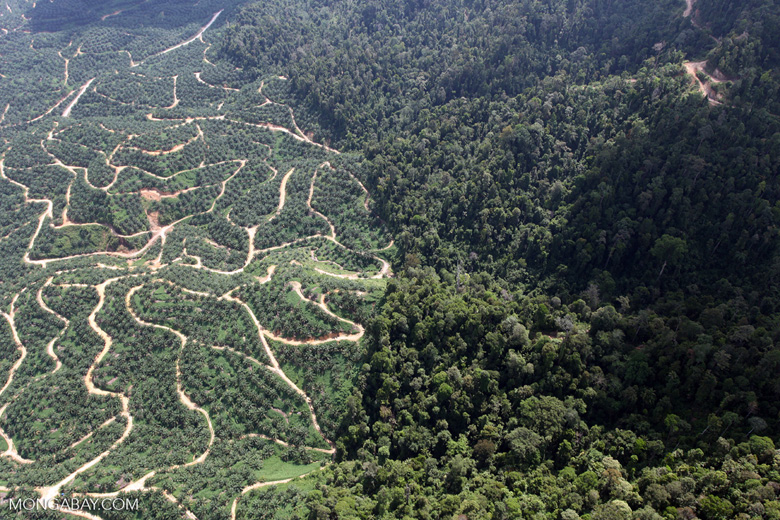- Indonesian and Malaysian ministers have derided as unfair and misguided the European Parliament’s vote to approve the phase-out of palm oil from biofuels by 2021.
- The vote Wednesday, over concerns about the environmental and social impacts of the palm oil industry, still needs to be ratified by the European Commission and member governments.
- Jakarta and Kuala Lumpur have filed official notes of protest, claiming a protectionist conspiracy to promote other vegetable oil producers, but activists say the EU’s concerns, including about deforestation, are valid and the ban justified.
JAKARTA — Officials in Indonesia and Malaysia, the world’s biggest producers of palm oil, have lambasted the European Parliament’s decision to phase out the commodity from motor fuels over the next three years due to environmental concerns.
Indonesian Trade Minister Enggartiasto Lukita said Thursday that the vote to reduce to zero “the contribution from biofuels and bioliquids produced from palm oil” by 2021 was misguided and unfair, given that Jakarta had taken steps to address the environmental impact of the palm oil industry.
“They can’t eliminate palm oil exports so easily because demand is very high,” he told reporters at the Indonesian parliament. “If it’s suddenly stopped, then what about Unilever detergent [which uses palm oil]? We don’t want to be the target of a negative campaign all the time.”
Enggartiasto urged the European Union to open a dialogue with the Indonesian government over its concerns about the impacts of the palm oil industry on the environment.

Ramifications for palm oil producers
The trade minister’s remarks came a day after the European Parliament voted on targets to cap crop-based biofuels, which follows the parliament’s overwhelming decision last year to ban the use of vegetable oils in biofuels. The amendments will now go to the European Commission and member states before they become law.
The move will have serious ramifications for Indonesia and Malaysia, who together produce nearly 90 percent of the world’s palm oil.
“The voting [Wednesday] in the EU Parliament to ban palm biodiesel was not only discrimination, but it signified a black day for free trade,” Malaysian Plantation Industries and Commodities Minister Mah Siew Keong tweeted Thursday.
He accused the European Parliament of engaging in protectionism to benefit the European oilseed industry — an argument frequently deployed by palm oil lobbyists who see a conspiracy to undermine palm oil in favor of vegetable oils produced in Europe and North America.
“A fair share of treatment should be given to other vegetable oils used in the biofuel mix in Europe, such as grapeseed. But then, the EU Parliament has always been anti-palm oil,” Mah said at a press conference in Malaysia.
Indonesia’s Enggartiasto expressed similar views, adding that other types of vegetable oils used in biofuels also required clearing sizeable plots of land — one of the key environmental sustainability concerns that has long dogged palm oil.
The Indonesian Palm Oil Producers Association (GAPKI) claims palm oil uses five times less land than vegetable oils like soy for the same yield, and that any deforestation as a result of clearing land for new plantations is legally permitted.

Diplomatic protests
This latest development has sparked fears in Indonesia and Malaysia that other countries could move to impose similar bans.
“Other countries might follow suit, as Europe is big and a market leader, and most countries view it as an important export destination, therefore there are chances they would do it as well to comply with the EU requirement,” Ahmad Kushairi Din, director general of the Malaysian Palm Oil Board (MPOB), said at the same press conference as Mah.
To counter the motion, the two Southeast Asian governments have sent official letters to the EU.
“We’ve written to the 27 EU energy ministers, with correct facts and solid figures, to again reiterate our stand, and to show our disappointment,” Mah said.
The Indonesian Trade Ministry last month wrote to the office of the EU trade commissioner and EU trade ministers to protest the proposal. It is considering sending another letter in the wake of the parliament’s vote.
“But [the amendment] has only been approved by the parliament; it hasn’t been passed into a policy,” the ministry’s chief trade negotiator, Iman Pambagyo, said in a text message to Mongabay. “We need to see how the European Commission reacts to the parliament’s decision. But right now we’re discussing steps that we’ll take before there’s any decision by the EU Commission.”

Threatened by palm oil expansion
While the governments seethe, conservation and indigenous rights activists have welcomed the phase-out vote, citing the massive toll the palm oil industry has taken on tropical rainforests and the local communities dependent on them.
Eep Saefulloh, a researcher with Sawit Watch, an NGO that monitors the palm oil industry in Indonesia, criticized the industry talking points that the deforestation caused was legally sanctioned.
“If we’re talking about large palm oil plantations, of course they cause deforestation,” he said. “Unless we’re talking about small farmers only need a hectare or two. But if we’re talking about large plantations that can extend beyond villages and districts, what do we call that if not deforestation?”
While he acknowledged that steps have been taken to improve sustainability in the industry, such as the implementation of various certification schemes such as the Roundtable on Sustainable Palm Oil (RSPO), he said the challenge was in how to apply those standards in practice, with some companies still clearing lands beyond those designated for plantations.
“We can see that everywhere,” Eep said. “The latest development is in Papua. We all know that Papua is our last frontier for our rainforests and it is also threatened by palm oil expansion.”
Banner image: The sun rises behind an oil palm plantation in Indonesia’s North Sumatra province. Photo by Rhett A. Butler/Mongabay.














